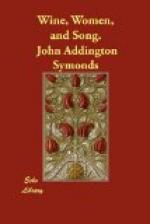Some folk may regard the things I have presented to their view as ugly or insignificant, because they lack the higher qualities of sentiment; others may over-value them for precisely the same reason. They seem to me noteworthy as the first unmistakable sign of a change in modern Europe which was inevitable and predestined, as the first literary effort to restore the moral attitude of antiquity which had been displaced by medieval Christianity. I also feel the special relation which they bear to English poetry of the Etizabethan age—a relation that has facilitated their conversion into our language.
That Wandering Students of the twelfth century should have transcended the limitations of their age; that they should have absorbed so many elements of life into their scheme of natural enjoyment as the artists and scholars of the fifteenth; that they should have theorised their appetites and impulses with Valla, have produced masterpieces of poetry to rival Ariosto’s, or criticisms of society in the style of Rabelais, was not to be expected. What their lyrics prove by anticipation is the sincerity of the so-called paganism of the Renaissance. When we read them, we perceive that that quality was substantially independent of the classical revival; though the influences of antique literature were eagerly seized upon as useful means for strengthening and giving tone to an already potent revolt of nature against hypocritical and palsy-stricken forms of spiritual despotism.
FOOTNOTES:
[Footnote 35: Golias de Conjuge non ducenda, Wright’s Mapes, p. 77.]
APPENDIX.
NOTE ON THE “ORDO VAGORUM” AND THE “ARCHIPOETA.”
See Section vii. pp. 16-23, above.
It seems desirable that I should enlarge upon some topics which I treated somewhat summarily in Section vii. I assumed that the Wandering Scholars regarded themselves as a kind of Guild or Order; and for this assumption the Songs Nos. 1, 2, 3, translated in Section xiii. are a sufficient warrant. Yet the case might be considerably strengthened. In the Sequentia falsi evangelii secundum marcam argenti[36] we read of the Gens Lusorum or Tribe of Gamesters, which corresponds to the Secta Decii,[37] the Ordo Vagorum, and the Familia Goliae. Again, in Wright’s Walter Mapes[38] there is an epistle written from England by one Richardus Goliardus to Omnibus in Gallia Goliae discipulis, introducing a friend, asking for information ordo vester qualis est, and giving for the reason of this request ne magis in ordine indiscrete vivam. He addresses his French comrades as pueri Goliae, and winds up with good wishes for the socios sanctae confratriae. Proofs might be multiplied that the Wandering Students in Germany also regarded themselves as a confraternity, with special rules and ordinances. Of this, the curious parody of an episcopal letter, issued in 1209 by Surianus, Praesul et Archiprimas, to the vagi clerici of Austria, Styria, Bavaria, and Moravia is a notable example.[39]




